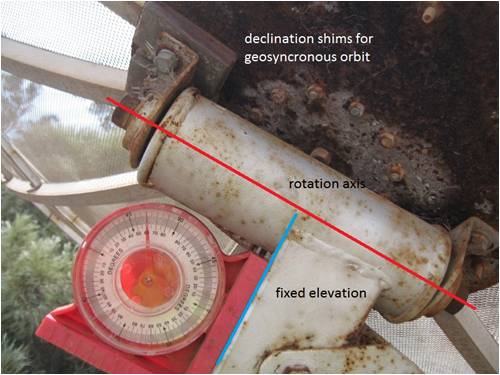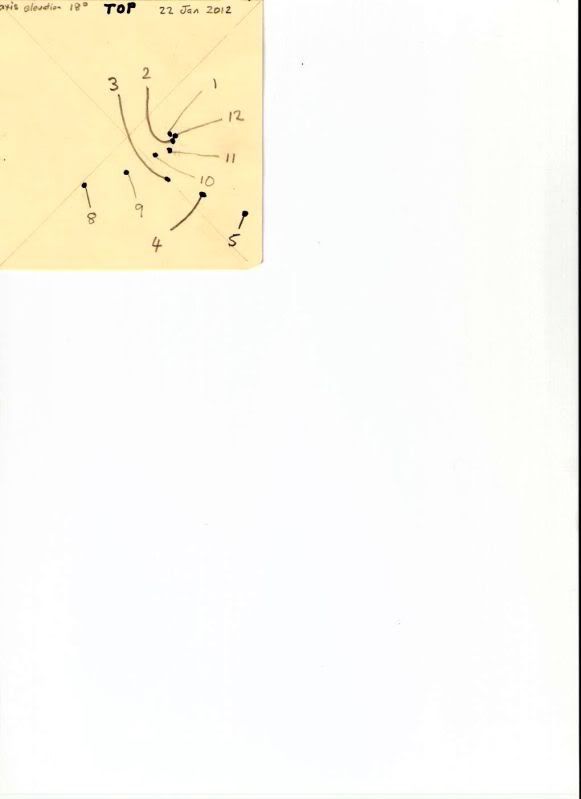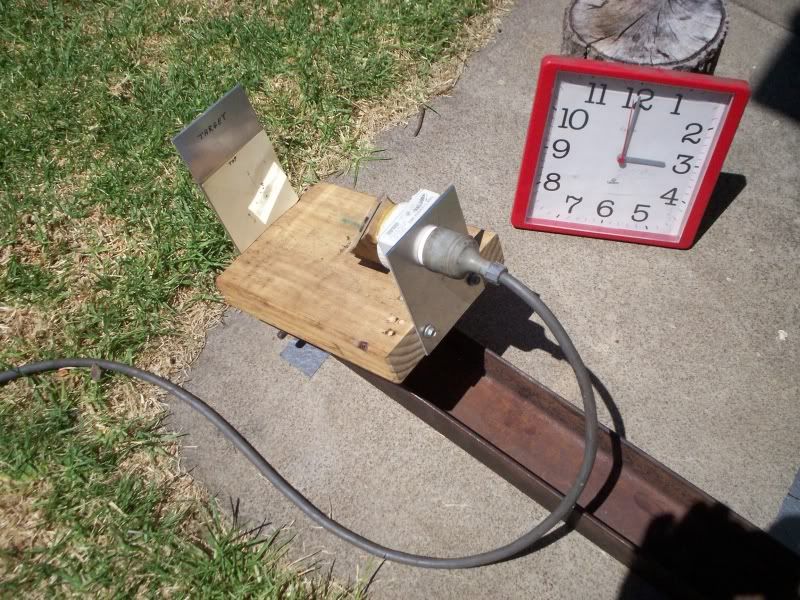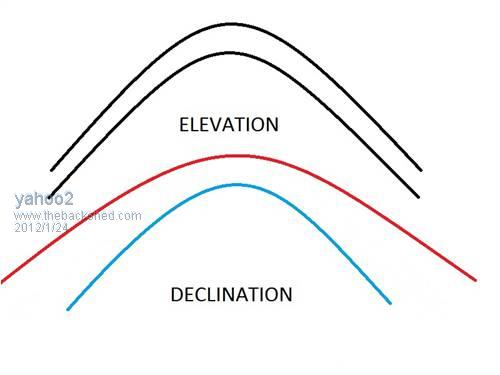
|

|
Forum Index : Solar : Solar Tracking
| Author | Message | ||||
| yahoo2 Guru Joined: 05/04/2011 Location: AustraliaPosts: 1166 |

the elevation for Melbourne would be 52 degrees. The plus and minus 23.5 degrees adjuster goes where the shims are placed on this old dish. I'm confused, no wait... maybe I'm not... |
||||
| Warpspeed Guru Joined: 09/08/2007 Location: AustraliaPosts: 4406 |
I just located a sun chart for Melbourne. According to that, solar noon right now reaches a peak elevation of about 72 degrees. The axis of rotation of my mirror will need to be ninety degrees to that, or at 18 degrees of elevation, so it "looks upward" at 72 degrees as it rotates through noon. The same sun chart says solar noon is about 1:20pm local daylight saving time in Melbourne. Anyhow, if the sun decides to show itself tomorrow, we shall see if the theory works, or I have screwed up. Cheers, Tony. |
||||
| Warpspeed Guru Joined: 09/08/2007 Location: AustraliaPosts: 4406 |
Plenty of sunshine today. The solar tracker reflected onto a target that I marked every hour starting at 8Am and ending at 5pm. Ten hours of data, and the path followed was a weird twisted pretzel shape. 
Here is an action shot at 3pm, although I did take a photograph every hour. 
Thinking about it, I suspect my mirror is probably not mounted at an exact 45 degrees, and is probably skewed in two planes, as it was all just hot glued together in extreme haste. The "spread" of points fits within about a six degree radius circle, so my mirror may be out by about three degrees. Probably the timer position was out too. I know both the elevation and compass heading are probably not exact as well. But maybe not so bad for a very first effort where nothing was accurately measured. Cheers, Tony. |
||||
| neil0mac Senior Member Joined: 26/12/2009 Location: AustraliaPosts: 210 |
I think that 3 degrees might be the maximum movement angle that you can get away with. You will also find that the movements around noon need to be closer together as at my latitude it moves 3 deg. in around 2 minutes. (Up to 25 minutes for 3 deg movement at sunrise and sunset, though.) |
||||
| Warpspeed Guru Joined: 09/08/2007 Location: AustraliaPosts: 4406 |
One thing is for sure. Positioning a mirror heliostat is infinitely more critical than directly tracking a much more tolerant flat plate absorber. I suppose it depends on how far away the target is going to be from the mirror. Every degree of mirror tracking error deflects the beam two degrees away from the target. It is probably not feasible to just build a dumb motor drive, and expect it to track within the required accuracy. Some sort of correctional position feedback is going to be a necessity. So maybe a dumb motor drive that grinds away all by itself 24 hours, but have a corrective circuit that can pull the system into tight solar alignment, but only when it receives direct high intensity sunlight. Cheers, Tony. |
||||
| yahoo2 Guru Joined: 05/04/2011 Location: AustraliaPosts: 1166 |
What you are seeing at the moment is a flattened arc you are only matching the suns elevation at two points during the day, it will track perfectly at the equinox, I didn't believe tilting the mirror above the axis would work to change the arc shape when I first seen it.  As you scale up the problem gets worse, parabolic dishes over 3 metres are a nightmare to point, even the weight of the dish will flex it enough to throw the accuracy out, as it tracks a moving object across the sky. As you scale up the problem gets worse, parabolic dishes over 3 metres are a nightmare to point, even the weight of the dish will flex it enough to throw the accuracy out, as it tracks a moving object across the sky.

I'm confused, no wait... maybe I'm not... |
||||
| Warpspeed Guru Joined: 09/08/2007 Location: AustraliaPosts: 4406 |
I have just ordered a five dollar 5 volt stepper motor/gearbox off e-bay. This has 2,048 steps over 360 degrees, which should be more than sufficient resolution for sun tracking. What I hope to try is hooking this up to a microcontroller so it will step exactly 180 degrees in twelve hours, then back 180 degrees in another twelve hours. It will need a "home position" which could be "east horizon" detected with an opto fork, so the microcontroller can keep track of the physical motor position by counting successive steps in either direction from there. By altering the crystal oscillator division ratio in software, I can make it run very slightly fast or slow, and do all sorts of clever things. A pair of optical sensors and a big shade blade could make it sun seeking, and crystal frequency locked running when overcast or at night. Finding the sun, and locking onto it is just as important as mounting the mirror at precisely 45 degrees. If I can get that to track successfully within a degree or two, even finer tracking lock could probably be achieved by position error sensing at the distant target. A second stepper could also be added to check and correct the seasonal tracking tilt angle (only corrected at at solar noon) with a very slow self locking lead screw. Cheers, Tony. |
||||
| neil0mac Senior Member Joined: 26/12/2009 Location: AustraliaPosts: 210 |
Unless you are on or north of the Tropic of Capricorn you will need a larger azimuth adjusment to track from dawn to dusk. (At 30 deg. S, I need 240 deg. of rotation.) Use this calculator to glean lots of info. .... http://www.pveducation.org/pvcdrom/properties-of-sunlight/su n-position-calculator |
||||
| Warpspeed Guru Joined: 09/08/2007 Location: AustraliaPosts: 4406 |
Yes, I fully realise that. Near the poles there will be 24 hours of available sunshine in mid summer. Quite odd to get up at 3am for a nocturnal pee, and see really bright sunshine outside! In my suburban Melbourne location, I cannot come even close to seeing a clear horizon in any direction. I lose about three hours at both sunrise and sunset because of the very long shadows cast by fences, and nearby buildings. For what I am doing here, twelve hours of tracking will see me deep into shadow at both ends anyway. It would be a simple software fix to make it track for many more hours during the day, and then scoot back much faster at night back to the dawn position. Maybe track for 16 hours, then return at double tracking speed for 8 hours, it would be very easy to do with a stepper motor drive. Cheers, Tony. |
||||
| panky Guru Joined: 02/10/2012 Location: AustraliaPosts: 1101 |
Hi Guys, A refugee from the microcontroller forum here. I've been working on a Caravan Battery Power Monitoring System and some discussions came up about solar tracking so I did some work on an Excel spreadsheet to calculate angles and how to maximise multiple angled panels to spread collection. It was created to work out power from multiple 200W panels on three different roof faces for Mt Barker in West Australia however all these variables are easily changed to suit your location and configuration. It also graphs the result so you can envisage the result more easily. Anyway, hope it may be of some use to someone. Cheers, Doug. PS. Apologies to the forum if this has been covered before by someone else. Doug. ... almost all of the Maximites, the MicromMites, the MM Extremes, the ArmMites, the PicoMite and loving it! |
||||
| panky Guru Joined: 02/10/2012 Location: AustraliaPosts: 1101 |
Whoops! Forgot the program. 2013-01-11_232819_Solar_Array_Configurator.zip ... almost all of the Maximites, the MicromMites, the MM Extremes, the ArmMites, the PicoMite and loving it! |
||||